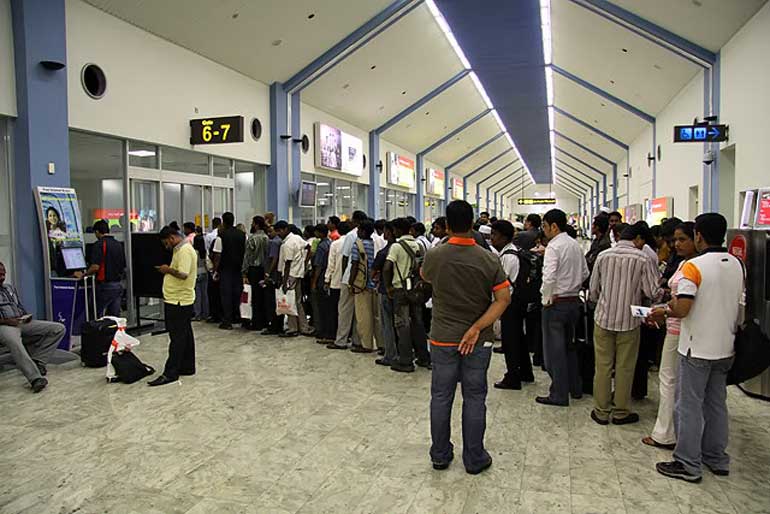Saturday Feb 21, 2026
Saturday Feb 21, 2026
Thursday, 14 January 2016 00:00 - - {{hitsCtrl.values.hits}}


Sri Lankans have been seeking foreign employment for more than five decades now. The real impetus began with the introduction of the Sinhala Only Act in 1956
This writer has had the privilege of being employed in Oman, Yemen, Bahrain, Qatar and UAE as an executive in the oil and gas industry. He has been a witness to the whole gamut of foreign employment operations from outside and from within.
Sri Lankans have been seeking foreign employment for more than five decades now. The real impetus began with the introduction of the Sinhala Only Act in 1956. This was a year that compelled those who studied in English medium to seek alternatives. The Burgher community migrated to Australia and took advantage of the thriving Australian economy that was willing to absorb foreign workers and grant them citizenship. Tamils migrated to Canada, UK and Europe.
But the systematic brain drain began in the 1970s with the rapid development of some of the Middle Eastern countries at a time oil exploration began in earnest and development of infrastructure projects such as road, bridges, airports and seaports. These development initiatives had a huge influence on the world economy. The construction companies made mammoth strides in Middle Eastern countries and were seeking foreign workers in large number. This opened up lucrative job markets for skilled Asians.
Middle Eastern countries have upgraded their standards
The macro and micro level economic factors have now changed the domestic economies of these countries. As such there has to be a holistic approach to providing labour force to these countries in terms of better qualifications and training. Some of the standards demanded by Middle Eastern countries have changed rapidly owing to the fact that some of these countries have adopted European standards in many aspects and are now in search of employees who could meet European standards.
Are Sri Lankans able to compete with those who are holding European certifications? Will there be a threat to employability of Sri Lankans overseas owing to new features demanded by the Middle Eastern countries. Is there a national policy on foreign employment? Has the government studied the competition among nations to provide skilled labour to Middle Eastern countries?
Remittances increased by leaps and bounds
The Asian countries, which were under British rule, such as India, Bangladesh, Pakistan and Sri Lanka had established educational institutions and had produced skilled workforce. However due to demands in Middle East and the domestic compulsions the people got attracted to lucrative foreign job markets for better wages for economic liberation. It was never an issue with the economy until remittances began to increase by leaps and bounds surpassing the value of traditional exports of Sri Lanka.
Over the years the foreign employment became a money spinner to the economy and government took the challenge to promote Sri Lankan work force for overseas opportunities as an incentive to develop the domestic economy. The UNP Government under late President J.R. Jayewardene introduced a bill in the parliament to create a dedicated Foreign Employment Bureau in 1985 (SLBFE) with the purpose of taking care of the whole breadth of foreign employment.
The main objective of creating the SLBFE was to:
(1) to promote and develop employment opportunities outside Sri Lanka for Sri Lankans
(2) to assist and support foreign employment agencies in their growth and development
(3) to undertake measures to develop overseas markets for skills available in Sri Lanka
(4) to assist licences in the negotiation of terms and conditions of employment with agencies abroad
(5) to regulate the business of foreign employment agencies and recruit Sri Lankans for employment outside Sri Lanka
(6) to issues licenses to foreign employment agencies for conducting the business of recruitment for employment outside Sri Lanka and to determine the terms and conditions of such licences
(7) to set standards for and to negotiate contracts of employment
(8) to enter into agreements with relevant foreign authorities, employers and employment agencies in order to formalise recruitment agreements
(9) to formulate and implement a model contract of employment which ensures fair wages and standards of employment
(10) to examine the authenticity of documentation issued to Sri Lanka recruits going abroad for employment
(11) to undertake research and studies into employment opportunities outside Sri Lanka for Sri Lankans
(12) to establish and maintain an Information Data Bank to monitor the flow of Sri Lankans for employment outside Sri Lanka and their return after such employment
(13) to undertake the welfare and protection of Sri Lankans employed outside Sri Lanka
(14) to establish a Workers’ Welfare Fund
(15) to undertake in collaboration with licensees, the training and orientation of Sri Lankan recruits going abroad for employment
(16) to provide assistance to Sri Lankan recruits going abroad for employment
(17) to receive donations and contributions from Sri Lankans employed outside Sri Lanka and use such donations and contributions for the rehabilitation, guidance and counselling of, and the provision of information and assistance to, the families of such Sri Lankans
(18) to undertake investments on behalf of Sri Lankan employed outside Sri Lanka
(19) to undertake programs for the rehabilitation of Sri Lankans who return to Sri Lanka after employment outside Sri Lanka.
It would be interesting to see if the above objectives of the SLBFE have been achieved through its administration over the years. There have been widespread allegations of corruption and misuse of power often under the guise of expending money for its own development but these disbursements were meant to enrich a class of cronies who have been running this organisation since its inception. The Central Bank statistics show that foreign remittances have outgrown and are now a leading money spinner for the economy. It is high time SLBFE underwent a radical transformation to sustain the growth of foreign employment avenues for Sri Lankans.
Can we compete with other countries?
The main competitors to the Sri Lankan labour force are from Pakistan, India, Bangladesh and Philippines. Sri Lankan labour has been recognised as one of the best work forces that have been of use to foreign markets given the level of competency and quality of education evinced by Sri Lankan expatriates in foreign countries.
The University of Moratuwa began a special training program to produce quantity surveyors to meet the former President R. Premadasa’s One Million housing program and with the completion of that program the Sri Lankan Quantity Surveyors (QS) were able to secure employment overseas. A vast majority of Estimators/QS employed in Middle East are from Sri Lanka who has had prior exposure with civil construction and those who were employed at Colombo Dockyard.
The ex-employees of Colombo Dockyard are holding senior executive position at shipyards in Middle Eastern countries. This was a by-product of President Premadasa’s vision. It is therefore high time SLBFE took a radical step to promote training among Sri Lankans seeking foreign employment. Similarly workers from Poland and Portugal, owing to decline of shipbuilding industry there, are now occupying senior executive positions with marine engineering and shipbuilding industry in Middle East.
National policy is long overdue
There has to be cooperation and assistance from heavy industries in Sri Lanka such as Colombo Dockyard, Ceylon Electricity Board (diesel power plants) to train personnel who could seek employment overseas solely because of their exposure to heavy industries (e.g. certification of welders and practical training at Colombo Dockyard, exposure to heavy diesel power plants at CEB). It is therefore high time a Presidential Task Force was appointed to look into the whole gamut of foreign employment operations and to recommend ways and means of sustaining this economic sphere for the future.
(The writer is freelance journalist, a political commentator and holds an LLM in International Commercial Law. [email protected].)